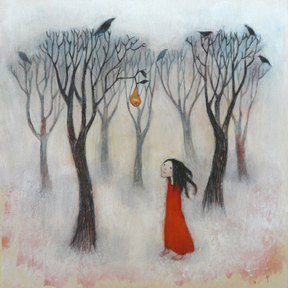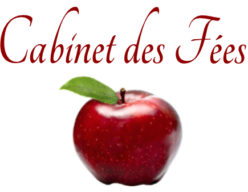 Once there was a woman whose father cut off her hands.
Once there was a woman whose father cut off her hands.
He said there were reasons for cutting off her hands; he said he was coerced. The devil made him do it; he needed her to marry, and apparently with hands she put up too much of a fight. We don’t know what her mother was doing during all of this.
But no one wanted her without hands, so, stumbling and bloody, she was free to go.
After two days wandering, she got to a walled-in orchard, full of pear-trees, and she could smell, she thought, each individual pear; that’s how hungry she was.
She said something out loud to herself’”something like, “If only I could reach those pears!” or “Goddamnit, I’m so hungry!” or something like that. And suddenly the wall sagged like it was made of melting plastic, and the trees leaned over so that she could reach them with her wrist-stumps and pull the branches down.
As she ate, the juice from the pears dribbled into her wounds, but instead of hurting, they seemed to help the stumps heal. She ate at least fifteen pears, maybe more.
The night gardener, who was supposed to watch out for people trying to steal the pears (but he didn’t watch too carefully because they didn’t give him enough money to risk getting shot by anyone, pear-stealers being what they were these days), saw her gobbling down the pears, juice on her face. He had never seen anyone eat with so much relish.
It was love at first sight.
They spent about a year together; she lived with him, and he helped her do everyday things, like eat other foods than pears, and she got a part-time job giving guided tours of the garden to visitors. Apparently the pear garden was something of a famous attraction. And everybody loved it when she pointed at things with her stumps.
She and the gardener had a kid together, and things were getting more serious, especially since he had to do a lot of the work for the kid.
But he kept asking her about how she lost her hands, and started trying to get her to see things from her father’s point of view.
“I mean, I’m not defending him’¦” he’d say.
She got someone to put their baby daughter in a carrying-pouch around her neck, and she left him. She didn’t know where she would go, though, or what else a woman without hands could do.
After about a half a day of travel, she saw a pond, and an old lady sitting next to it. She asked, “Could you do me a favor and give me a cupful of water?” She showed her stumps to prove she was helpless. The old lady told her to bend over and drink.
“In my day,” the old lady said, “everybody had to drink for themselves.”
She leaned over to try to get a drink. But as she drank, her baby slipped out of the pouch and into the water.
“Oh, my god!” cried the old lady, forgetting about how everyone had to drink for themselves. “I’ll go call 911!”
But she didn’t hear the old lady, because she had jumped in after her baby, not even thinking about whether or not she could save her. It was hard, because at first she tried to reach her child with the hands she sometimes forgot she didn’t have. It became clear that that wouldn’t work. So, with a lot of effort, she wrapped her forearms around her baby, pulled her in close, and kicked and waded her way out of the water. She was still burping water out of her child’s lungs’”something else she’d never done before’”when the old lady showed up with the police.
“Thanks,” she told the woman, holding out her right stump to shake. “You’ve changed my life.”
When the woman offered to help put the baby back in the pouch, she shook her head. “No,” she said. “I really think I can do that myself.” And she did, too. But in the future, when she was thirsty, she waited until she found a drinking fountain.
She got a job doing telemarketing for a little while (punching in the numbers with a pen in her teeth), until she made some good friends with more interesting occupations and made a living as a percussionist in a couple of bands. She found she got a better sound out of the drums than anyone else. And it was funny, she told her child at night, that no more walls melted for her and no more trees leaned over so she could eat from them’”but she really didn’t think it was a loss.
One day, a few years later, she saw the night gardener sitting in the front row at one of her concerts, but he looked right at her and didn’t recognize her at all. Which was fine with her. She finished the concert, and the next day taught her daughter how to tie shoelaces.
Olivia V. Ambrogio‘s creative work has been published in Electric Velocipede, Café Irreal, Fugue, Coal City Review, Flashing in the Gutters, Controlled Burn, Red Cedar Review, Corridors, The Herbal Network, Yemassee, Onionhead, Yuan Yang, Green Silk Journal, The Bathyspheric Review, and Abandon Automobile: An Anthology of Detroit Poets (Wayne State University Press). She has a PhD in marine biology from Tufts University, where she studied the sex lives of marine snails.
IMAGE: The Handless Maiden, Lucy Campbell, September 2008. Used with permission.
